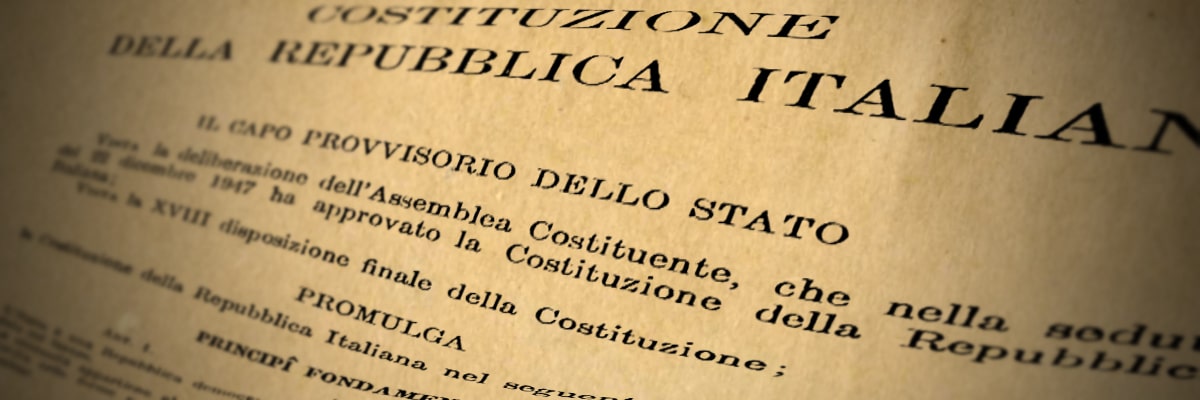"The premise from which all of them [the national reports of the courts, A/N] agree is the distinction of roles between the legislative power and the constitutional courts: the latter being inhibited from any political evaluation pertaining to the merits (i.e., convenience, appropriateness, adequacy for the ends achieved, etc.) of the rules dictated by the legislature. The task institutionally entrusted to the courts is, in all systems, limited only to the control of the conformity or otherwise of laws with constitutional provisions..."
Vezio Crisafulli, Overall Report to the Third Conference of European Constitutional Courts, Rome, October 1976
In one of his many interviews in recent months, Giuliano Amato had occasion to say that the current government "of the right-wingers" would be a danger to our democracy. To then add that the Constitutional Court can be an important counterbalance to such risks, since its institutional task is precisely to review and thus control the legitimacy of the laws enacted by the incumbent government.
Leaving aside any consideration of the first assessment, which is very serious but is evidently on a purely political level, it is interesting to delve into the second, which should instead be ascribed to the distinguished lecturer and constitutional law scholar.
In fact, the figure of the politician and that of the jurist have always coexisted in Amato's character, and perhaps no one like him has been able to integrate them to the point of making them indistinguishable. The authoritativeness of the scholar and the apparent technical nature of many of his choices have thus often ended up allowing him to move with remarkable ease in the national political landscape, transiting without stumbling from the ruins of the first to the splendors of the second Republic, from the shores of Craxian socialism to those of the heirs of the Communist Party that emerged unscathed from the storm of Mani Pulite, until he fully identified himself, late in life, with the most radical progressive currents influenced by the Wokeist ideology of Anglo-American matrix.
After placing himself for years on apparently super partes positions, even with the prospect of sooner or later running for the Quirinal, once that possibility vanished, Amato decidedly veered toward a radically neo-progressive orientation, in open opposition to the current center-right government. Nothing wrong, of course, if it were not precisely for his established authority as a jurist, which still allows him to externalize evaluations on constitutional law with that "technical" license that by now should no longer belong to him. And so, when he says that the role of the Constitutional Court would be to counter the majority, there is a real risk that he will be taken seriously by the many who have no expertise in the field of law. And this is, on closer inspection, a true legal heresy, totally at odds with the principles that have always governed our legal system. The Giuliano Amato lecturer of a few years ago would certainly have been horrified at a law student who had given him such a definition of the Court.
The deliberate overlapping of the role of jurist with that of politician is, after all, a specialty of the progressive world; many examples could be given, but to remain in the nobler quarters of the world of law, it is useful to mention Gustavo Zagrebelski, also a former president of the Court, and a distinguished lecturer and constitutional scholar.
Also very much present in the political debate, he has repeatedly made very harsh statements against the center-right government. A few weeks ago, after the incidents in Pisa between police forces and leftist students demonstrating against the Israeli attacks on Gaza, Zagrebelski, interviewed by "Repubblica," had the opportunity to make his assessments of the Meloni government explicit: "Article 17 of the Constitution says that all citizens have the right to assemble, provided that the meeting is peaceful and without weapons. It is under fascism that permission from public authority was needed...The right to demonstrate is the first to be affected in authoritarian regimes."
In short, the management of street demonstrations would be an expression of an authoritarian government that openly violates the principle enshrined in Article 17 of the Constitution. A clear political condemnation, but also a strong and unimpeachable call to respect the right to demonstrate, and on this second point one could hardly object to the jurist.
But that Zagrebelski really intends to defend the right to demonstrate as such, and not rather to attack through that argument the "fascist" government, is unfortunately a mere optical illusion. In fact, here is what he thought a few years ago about other protesters - who were, moreover, much more peaceful than the students in Pisa - who were contesting the choices of the PD-backed government regarding the pandemic emergency:
"Those who take to the streets to the cry of freedom should use the right word which is arbitrariness. It is the bullying of those who want to do what they want." (Huffington Post, September 2021).
Exactly as Amato explains to us that the Constitutional Court must act as a counterbalance to the majority, but, of course, only when the right governs, the Zagrebelski who defends the right of the students of Pisa to demonstrate is the same one who unscrupulously condemned, and pointed to the public pillory, promoters and participants in demonstrations of dissent from the Draghi government.
In this sort of variable-arrangement constitution, then, the right to demonstrate fades until it almost disappears if there are progressive-leaning political forces in government, only to expand fully again when center-right parties or coalitions land in the executive.
What these examples make clear cannot evidently be traced back to mere political dialectics between exponents or parliamentarians of opposing factions. Instead, it is a blatant and instrumental distortion of legal principles by someone who has the merit, but also the responsibility, of having taught the constitution to generations of students, as well as having held the position of president of the court, that is, the body that should represent the highest guarantee for citizens of the impartiality of republican institutions.
In reality, the signs attesting to this dangerous drift of the world of progressive intellectuals, and their casual and cynical use of the words and principles of the rule of law for exclusively political purposes, are increasingly numerous, and have accelerated further since there is in government a line-up that they consider to be made up not of opponents but of enemies.
And the point to which this reflection leads is precisely this: while in the years of the First Republic, the communist left, having accepted the rules of the democratic game, fought its political and electoral battles on the level of political, ideological and even cultural proposals, the progressive forces, heirs of those parties, have chosen, in ours as in many other countries, the path of aprioristic delegitimization of their opponents and even of the voters who vote for them. By transferring the competition from the political terrain to the ideological and moral terrain, and arbitrarily attributing to right-wing and conservative parties the label of more or less direct heirs of fascism, they come to consider any means of striking them permissible, even that of manipulating the principles of the constitution. Principles that are then, from time to time, instrumentalized and bent to the political ends of the moment, in total contrast to those requirements of balance and stability of the order that should be a primary duty of a ruling class worthy of the name.
And so here we have a small army of journalists, writers, scholars, and even, as we have seen, prestigious jurists, who, while striving to strike out by all means against the majority and the government they deem unworthy to lead the country, are in fact proceeding with a lethal work of delegitimization of institutions and constitutional principles, without caring about the irreversible damage their behavior risks producing to the country.
This scenario is all the more disturbing when one considers that the party of reference of this army, although clearly defeated in the 2022 elections, still holds, more or less directly, a vast majority share of men and resources in the most delicate and strategic centers of power, from the judiciary to the major newspapers and television networks, from the high ministerial bureaucracy to the world of academia.
And yet, the impression is that in the cultural and political universe of conservatives, all this is still not adequately perceived - with a few brilliant exceptions - or, at least, has not yet produced any form of strategy, to defend the free confrontation of ideas and respect for constitutional guarantees, which are placed to protect all citizens, regardless of their political orientations and electoral choices.
A graduate in Law (University of Rome "La Sapienza"), after a brief experience as a civil servant in the Ministry of Labour, he was a parliamentary adviser in the Chamber of Deputies for more than 30 years.








Scrivi un commento